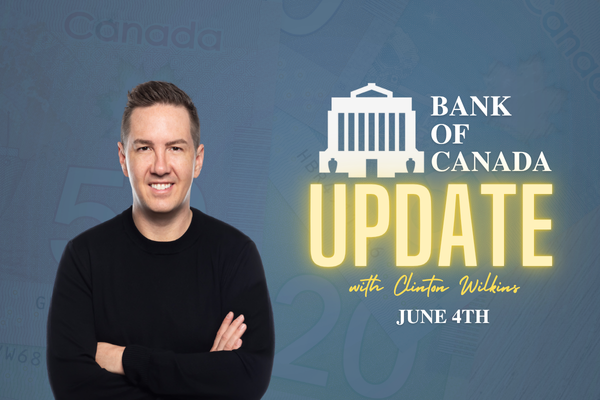Clinton Wilkins joins Todd Veinotte on 95.7 News Radio to discuss The Bank of Canada holding its key policy rate at 2.75%, marking the first pause after seven consecutive cuts.

Special Report: Millennials feel hopeless about homeownership, July 4th
Clinton Wilkins joins Todd Veinotte on CityNews to talk about the homeownership challenges facing millennials in Canada, why first time home buyers need to get creative and the impact of family gifts.
Todd Veinotte 00:00
We got some more business to talk about including a story about the majority of millennials and Gen-debtors don’t see homeownership as a possibility. When I saw the story, I thought who would be the best person to offer me incredible insight on this? And of course, it’s Clinton Wilkins, our mortgage guru, Clinton Wilkins. Thanks for coming into the studio today.
Clinton Wilkins 00:19
Thanks for having me, Todd
Todd Veinotte 00:20
Didn’t bring me any coffee I noticed. I don’t know you used to bring me coffee all the time.
Clinton Wilkins 00:22
Not today. I thought you probably would be well caffeinated. Especially, you know, after the weekend, or, you know, maybe you’re drinking water today. I’m not sure. I know I guess maybe the honeymoon periods over. I get to see you so often now that you know, I didn’t even think about it to be honest. I got my I got myself one on the way here though.
Todd Veinotte 00:40
The honeymoon phase is over. No more coffee. Anyway, that’s okay, you next time. I’ll remember next time for sure. Well, in fairness, whenever we record our show, at the studio, you always provide or somebody’s providing me a couple of beverages when I’m there.
Clinton Wilkins 00:56
Yeah exactly, there’s nothing better than you know that having a couple beverages while you’re doing your podcast. And, you know, I think, you know, for us, it’s just a little bit of a social hour as well, you know, we get to do an hour that our listeners here on CityNews get to listen to and we, you know, talk about mortgage lending, homeownership, and you know, what’s going on and in the economy and things like this. And I think it just, it’s a good time. It’s like we’re doing it in the evening. And, you know, we’re celebrating with people. And you know, we’re talking about some really deep and important issues as well. Yeah, we’re gonna be on here in a couple of weeks. And we’ll definitely queue it up here for our listeners and let you guys know, when it’s coming, but lots of important things to talk about. And, you know, as you touch on all the time, it’s always changing. And something’s always happening, you know, in the real estate, in mortgage finance, and government policy, and we’re talking about these issues.
Todd Veinotte 01:25
That’s right, it’s mortgage 101, your guide to homeownership. And it airs every night, once a month on Saturday and Sunday. We’re recording this month’s – Alright. So that’s why I thought this is an important story to discuss. It’s got to be really challenging and almost heartbreaking for I mean, I’m reading the story. And there’s a law student, there’s somebody who’s graduated from law school in the story, I mean, this is unheard of, you’re not that all that long ago, right?
The challenges for millennials in Canada
Clinton Wilkins 02:11
Yeah, when I first started in this industry, 17 years ago, we used to always say, if you had a heartbeat, we could get you a mortgage. So we would throw something on the at the wall, see if it stuck, and then we can kind of continue on our way. The times were different back then, you know, we were doing 100% financing, 40 year amortizations, refinances at 95% of the market value of the home. And that’s when the real estate prices were more steady. And, you know, especially in Halifax, you know, traditionally we saw the values being, you know, 1, 2, 3% increases per year. But in areas like Ontario and BC, the real estate values really became a runaway train kind of what’s going on with inflation right now, Todd, and the federal government needed to, you know, bring some more measures in place to slow the real estate market. And you know, over a series of changes and policies, you know, things got tighter and tighter, and the pendulum now has swung basically the other way. The challenge is, the real estate market still is overheated. And that’s part of the reason that we want to obviously slow the inflation, and we want to bring the economy down, grind it down as much as we can. But the real estate really still has been booming. There are certainly impacts that are being had, you know, in Ontario and BC, there have been much deeper impacts of the real estate market now with the rates being much higher. Things are definitely slower in those provinces. In Nova Scotia, we’re seeing many less sales and there’s less property still being listed. So the demand still is quite high. But the challenge is, and especially for millennials, it’s very tough. And you know, you have to have a lot of income to qualify just to get into this real estate market just to get into that ladder to make your first you know, your first purchase. And, you know, in Nova Scotia right now, or at least in Halifax, the average home price is over 500,000. So a household really needs to make over 100 or 125 or $150,000 a year to even qualify to get into the real estate market. And we’re not talking about your dream home, Todd, we’re talking about just getting into the real estate market. And then hopefully over the next series of years you can pay down your mortgage, and hopefully your property appreciates so you have more equity than maybe to buy your dream home at that point. But I think just to break into that, just making that first purchase, you need to have a lot of determination. You need to have a good income, you need to have good, good credit. And in many cases Todd we’re seeing large family gifts to the tune of, you know, $100,000 or more because many of these borrowers that are buying these homes are needing to put down 20% or more just to get into the real estate market. So forget high ratio insurance from the Canadian Mortgage Housing Corporation, Sagen and or Canada Guaranty where technically you can qualify to get a mortgage and buy a home with as little as 5% down. The challenge is, you need to have even more income to be able to qualify at that level. Right. So I think that’s the biggest challenge. The incomes have not paced with the increase in the property values and and of course, government policies are not going to make it easier anytime soon for borrowers to qualify. So I really feel for first time homebuyers. It’s a tough time.
Todd Veinotte 05:14
Alright, so my goodness gracious, what type of I guess what advice can you give, besides save as much money as you possibly can and have a job that pays as much as you can? Really it comes down to that, doesn’t it?
Creative solutions and the impact of family gifts
Clinton Wilkins 05:24
Well I read an article last week that, you know, in Toronto, people have to save for something like 37 years, either their income to be able to qualify to get the downpayment, to buy a property. So, you know, I think large family gifts are certainly a big impact here Todd, and maybe you don’t go in as a single person and buy a home, maybe you need to buy a home with a plus one. Maybe if you’re not in a relationship, maybe you need to buy a home with a friend, partner, or some type of partner, right? Like a business partner. Yeah. And maybe it’s not a business per se. But maybe, you know, two people go in on it. I’ve even had situations where I’ve had three and four borrowers go in on buying a home, I actually had one relatively recently, they bought a two unit home. And there were four borrowers on the mortgage and on the title, they needed it. They needed that amount of income to make it all jive. And we did a high ratio purchase, the insurer was good with it, the bank was good with him, they asked me a, you know, a couple extra questions, you know, what’s the relationship here? Well, these two are in a relationship. And the other two are friends. So there was, you know, two people in a relationship, there were four borrowers total, it all worked out. And financially, they even said, they’re like Clinton, this is not forever. This is just to get us into the housing market. And you know, our goal in five to 10 years, either one of them is going to buy out the others, or they’re going to sell this property that maybe buy homes on their own. So, you know, I think you need to think more creatively now. And, you know, I say, you know, you need to bootstrap it a little bit, it’s like, how can you do it, because otherwise you’re going to be on the sidelines. I think over the last three years, the biggest concern with millennials is that they’re not gonna be able to get into the housing market at all. So it’s not about getting into the housing market today, or three months or a year from now, they’re concerned that they will never be able to get into the housing market, because they just don’t think that their income is going to be enough. And they don’t think that, they think that the property values are still going to continue appreciating at this rate. I think the values certainly have leveled off Todd. I think it’s still in a seller’s market. And I think we’re going to be in a seller’s market for a long time, at least here in Halifax, we don’t have the supply to keep up with the amount of demand. But, you know, unless you’re doing this with a plus one, I think it’s very prohibitive for most people to get into the housing market. And I really, really feel for first time homebuyers. They’re having a hard time.
Todd Veinotte 07:48
We think first time homebuyers, we think of somebody in their 20s. But you’re probably seeing people in their 40s and 50s, who are wanting to get into the home market.
First time homebuyers are facing a lack of inventory
Clinton Wilkins 07:56
Lots, and you know, I think years gone by, you know, maybe they could have done it, but it was never a priority. And, you know, I think when people’s situation and life changes, you know, their priorities change. We just went through a major shift culturally, I think, you know, obviously, in Canada, around the world, with the pandemic, we really evaluated the way that we’re living. And the way that we want to live in there is much more, you know, maybe focus on your home, that maybe the focus wasn’t there before. And, and then that’s really what kind of increase the demand as well, people were really assessing the type of living situation that they want, you know, maybe it’s more important for someone to be maybe more out of the city or maybe condo living is right first for someone. And, you know, part of the challenge is and I think for first time homebuyers, we were in a period of time where first time homebuyers were buying their dream home. So new construction, granite countertops, stainless steel appliances, I you know, I use this kind of like as a joke that the people are, you know, buying these, you know, huge mansions and whatever. But traditionally, first time homebuyers will buy a starter home. The challenge is there’s no starter homes to buy. So the little old man and the little old woman that might have gone into an apartment, there’s no apartments to rent, the little man or the little woman that would maybe would go into like maybe more of a retirement type situation, there’s no, there’s no beds, there’s no access to that type of housing. So this real estate is not even coming on the market for the chance for millennials to get it. And you know, we have a lack of inventory in every vertical, whether it is single family homes, semi detached, condos, apartments, senior living. In every vertical of housing, at least in this city and in this province, there’s supply chain issues, and until the supply is changed, we’re gonna still have issues with millennials getting into homeownership. But you know, the parents that are listening to this, you really benefited from your home property value appreciating and that’s really why we’re seeing big family gifts. I’m seeing parents that are refinance thing, and also putting home equity lines of credit on their home to help their kids out, get into the housing market. And it’s not that they have money necessarily to do it, they’re not writing a check, in some cases, they are boring the money to help their kids. Because if you don’t help them, these kids are never getting into the real estate market, likely until they’re going to get inheritance from you.
“You really have to fight for what you want.”
Clinton Wilkins 10:20
And that’s I think, what when the parents are like, okay, let’s think about this logically, we benefited. So why can’t we help our kids out. And so some parents are willing, some people put some parents are able, and I think everybody kind of needs to be involved, at least right now to you know, get into this real estate market. And, and, you know, it’s, it’s a challenge. And I think, you know, you really have to fight for what you want, and you need to plan. And I think, you know, getting a pre approval in place, knowing what you can afford is really important for people that are getting into the real estate market. And I say, you know, once you have your financing lined up, and once you know where your down payments coming from, it’s really, really important to get good advice from a realtor that you trust, because this is the biggest purchase of someone’s home, or wrap up biggest purchase of someone’s life. And, you know, it’s a big decision. And I think that, you know, you really need to make sure that you’re going to be protected, and that you’re going to make good decisions. Because, you know, this isn’t something that people should do lightly. And things were happening very rapidly and quickly the last few years. So I think some of these decisions kind of went out the window, and we were kind of, you know, just going as quickly as we can, I think I think now it’s better to be even more planful than we were before.
Find a broker you trust
Todd Veinotte 11:30
Right. And just to wrap up, have the conversation with a broker. Find somebody who’s creative, like yourself.
Clinton Wilkins 11:37
Yeah, get somebody that you’re going to trust because, you know, in 90 some odd percent of people that are buying homes, they’re getting a mortgage. So if you can’t get a mortgage, I think that’s your first challenge, right? You know, I think the mortgage piece is important. Obviously, the down payment piece is gonna be important. You don’t really work with a realtor that you’re going to trust because you’re gonna spend a lot more time with the realtor than you are going to be with us or whoever you’re going to be getting your mortgage financing from.
Todd Veinotte 12:01
Alright, Clinton, always great insight and look forward to our next show. And thanks for coming into the studio as always
Clinton Wilkins 12:07
Thanks for having me, Todd. Happy Tuesday. I know it feels like a Monday and I think it’s gonna be a busy week.
Todd Veinotte 12:12
Absolutely. That’s Clinton Wilkins our mortgage guru.


